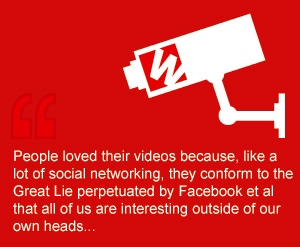The Ken Burns effect
Facebook turned ten in early February and, like all ten year olds, it is prone to over sharing. The Informer has long lurked on Facebook, a silent voyeur struck by an often morbid curiosity to click on the banal and fatuous items in his newsfeed. And if your newsfeed looked anything like the Informer’s in early February, it was chock full of people sharing their ‘life story’—Facebook’s gift to the world after a ten-year social bender.
February 7, 2014

By The Informer
Facebook turned ten this week and, like all ten year olds, it is given to over sharing. The Informer has long lurked on Facebook, a silent voyeur driven by morbid curiosity to click on the banal and fatuous items in his newsfeed. And if your newsfeed looked anything like the Informer’s this week then it was chock full of people sharing their ‘Look Back’—Facebook’s gift to the world after a ten-year social bender.
What you got, if you were tempted to click, was a couple of minutes’ of blandly sound-tracked video constructed of soft fades and stills from ‘milestone’ events in your life. Not your actual life but your Facebook life—according to Facebook, after all, we were all of us ‘born’ only when we established our profile.
People loved their videos because, like a lot of social networking, they conform to the Great Lie perpetuated by Facebook et al that all of us are interesting outside of our own heads. And also because the films made everyone’s lives look like one a mawkish Christmas TV adverts in which everything is viewed through the soft focus of sentimental tears.
They turned every photo of a poorly executed novelty birthday cake into a portrayal of triumph in the face of monumental adversity. Touching the Void? Forget it; check out this Daliesque Elmo!
It was awful. The Informer declined to even look at his own, such was his fear of misinterpretation. As one of his close personal friends exclaimed: “Do I want to share my Facebook film? It makes me look like a drunken, gun-loving, hobo, so no, I don’t want to.”
Is Facebook the Mirror, Mirror on the Wall or has it made control-freak spin doctors out of all of us, desperate to (social) media manage the way we are perceived? It would be interesting if someone hacked Facebook’s Look Back algorithm so it featured only photos that people had chosen to delete. There would be a lot more horror movies and a lot less romcoms.
Technology can be spookily accurate sometimes but at others it can skew our perception. There was something disturbingly terminal about all those fades of beaming smiles, as if we were watching epitaphs. It reminded the Informer of that Robin Williams movie, the Final Cut, based in a future in which everyone has a chip implanted in their head that records every moment of their life. Williams’ plays an ‘editor’ tasked with cutting those videos after the implantee’s death for showing at a remembrance service. The catch is that he is paid to show them only in a good light, forced to watch through and edit out all of the really horrible stuff they get up to.
How would we like to be remembered? It’s a fundamental question and one that chimes with the headlines from the first weeks of 2014, amid the Guardian’s Snowdengate intelligence leaks proclaiming the death of privacy and US newspapers covering the death of network neutrality.
It didn’t take AT&T long to hit the headlines again on the latter note, due to the revelation that the US operator has filed a patent for a technology designed to prevent its customers from consuming “an excessive amount of channel bandwidth”.
The filing describes a system, whereby a customer is provided an initial number of credits and as they consume the credits, the data they download is verified to determine if it is “permissible” or “non-permissible” according to their package. Non-permissible data could include file-sharing and movie downloads if the user’s subscription plan does not permit such activity and would consume credits. In the event of a consumer using all their credits, they would be required to pay more money, be subject to sanctions such as the blocking of certain traffic types, or be incentivised to maintain “preferred consumption” habits.
Consumption habits are set to be under the microscope in the UK, if the reports are true. Stoke-on-Trent City Council is planning to send daily ‘motivational’ texts to obese people in the area to help them lose weight in a bid to take the strain off the NHS. Given the reputation local councils have for spying on people’s private lives, the Informer expects the texts to be along the lines of: “Out of the lift and take the stairs, Chunky!”.
Swedish kit vendor Ericsson was doing some consumption of its own, making another acquisition in the TV space, this time of Massachusetts-based Azuki Systems, a provider of TV Anywhere delivery platforms for service providers, content owners and broadcasters. The acquisition bolsters Ericsson’s TV and media portfolio following the recent addition of Mediaroom from Microsoft.
There was similar activity from network optimisation firm JDSU, which picked up the world’s most fashionable real time intelligence software provider, Trendium, for an undisclosed sum.
SMS is going out of fashion in Eastern Europe according to research from AnalysysMason, which found that in several countries, such as Bulgaria, the Czech Republic, Hungary and Lithuania, messaging revenue has entered decline, suggesting that OTT services are already starting to have an impact, either directly or because operators are taking pre-emptive action to stave off the threat.
Anecdotally, applications such as WhatsAppMessenger and LINE are gaining in popularity, and as smartphone penetration increases, the impact will intensify, because of the network effect. Tariffing also plays a role – for example in the Czech Republic operators have introduced new tariffs that are re-aligned to favour data over voice and messaging, which will encourage smartphone adoption, and hence OTT usage.
In other markets such as Russia, Turkey and Ukraine, smartphone penetration is lower, and 3G/4G networks are less advanced, which serves to support traditional messaging services. However, in the medium term, the OTT threat is, if anything, more intense, the analyst said. In Turkey in particular there is a young population that has tended to adopt new means of communication where available at the right price and the same can be said for Russia and Ukraine. “We therefore expect a strong substitutive effect across the region during the course of our forecast,” Analysys said.
Indeed, the most serious challenge mobile operators face over the next five years is the competitive threat from OTT players, according to overall respondents to the Telecoms.com Intelligence Industry Survey 2014, the first results of which were announced this week. Almost 50 per cent of respondents rating the OTT threat a six or seven on a one-to-seven scale of severity. But operators in isolation judged regulatory pressure on pricing to be the biggest threat, with almost 60 per cent of operator respondents giving this a high rating for severity.
Back on the subject of Eastern Europe, the Winter Olympics kick off in Sochi, Russia, today. If you’ve been keeping tabs on the news, you will have watched the PR car crash unfold as pictures of unfinished hotel rooms and brown tap water appeared online. There’s also a total hack fest going on if reports are to be believed. One NBC reporter had his phone and laptop hacked whilst sitting in a cafe discussing with a security expert how to set a honey trap to see how long it would take for a laptop to be hacked. Indeed, once the trap was set it took less than a minute before the attacks started, prompting the media to state that visitors to Sochi should expect to be hacked almost immediately.
Of course if you want to properly cleanse an infected device you could just detonate it. Darpa, the US Defense Advanced Research Projects Agency, has paid IBM £3.4m to create a self destructing chip. It sounds like something out of a spy film, which is quite possibly a legitimate use, and features a fuse that shatters a thin glass substrate which forms the base of the chip following a wireless radio command. The project reportedly came into existence after an embarrassing incident where the US left a downed stealth copter at the site of the operation to kill Osama bin Laden. Whoops.
Spanish telco Telefónica and US carrier Sprint were both working on ways to get machines talking, having announced M2M plans. Telefónica announced the next phase in the launch of its M2M Global Channel Partner Programme, expanding the initiative to Europe ahead of a global launch. The initiative is already live in the US, where more than 80 partners enrolled in less than seven months.
Sprint is relying on another company that sounds like a Game of Thrones character, Aeris Communications, to deliver its M2M service platform, which will enable it to target eHealth, Fleet Management, Telematics, Connected Auto, Utilities, Monitoring and Control, and Point of Sale.
In related news, the US could soon make M2M connectivity in new vehicles mandatory, following research undertaken by the US Department of Transportation’s National Highway Traffic Safety Administration (NHTSA). The government body has conducted a year-long pilot programme on vehicle to vehicle (V2V) communication technology and plans to publish a report in the coming weeks, before beginning work on a regulatory proposal that would require V2V devices in new vehicles in the future.
The Department of Transportation’s research has suggested that V2V technology can prevent the majority of crashes involving two or more vehicles.
Dutch operator KPN could have done with crash avoidance technology, after recording a ten per cent year on year drop in revenues for FY2013, as well as a 6.7 per cent drop in net profit. The group added that it is looking to create a leaner operating model by making redundancies over the next two years. This is following the completion of a staff reduction programme started in 2011, which has resulted in 4,650 fewer full-time equivalents (FTEs) in the Netherlands. An FTE is a unit of measurement that indicates the workload of an employee – an FTE of 1.0 is equivalent to one full time employee. The group said it has over 30,000 FTEs worldwide. They’re people goddamnit! Not units! But unfortunately the next step to create a leaner business model is for KPN to reduce its workforce by a further 1,500 to 2,000 FTEs by 2016, the company said.
But while some companies were falling apart, plenty of others were coming together. Even Samsung and Cisco have agreed to bury all patent spats for the next decade with a cross licensing deal. Samsung must be in a very friendly mood, as this is the third such deal in a month, following similar agreements with Google and Ericsson.
French operators BouygesTelecom and SFR agreed to roll out a shared network covering 57 per cent of the French population, managed by a joint venture looking after RAN assets covering 2G, 3G and LTE services.
The network covers all of France but excludes the country’s 32 largest urban areas that have more than 200,000 inhabitants and blind spots that are currently not covered by either operator. The two said that the agreement will enable them to improve their mobile coverage and generate savings.
In the UK, a five-year, multi-million pound deal will see VirginMediaBusiness upgrade 3 UK’s backhaul services through its nationwide fibre optic network. The new service will provide better connections between the company’s 15 aggregation sites, already underpinned by Virgin Media Business via MBNL, the 50:50 network joint venture between 3 and EE, and three core data centres across the UK.
Mobile money firm Monitise acquired Istanbul-based mobile technology specialist PozitronYazilim, in a £24m all-shares deal that highlights the growing demand for mobile financial services in the eastern Mediterranean’s largest market.
In other finance news, the mobile commerce joint venture set up by UK mobile operators O2, Vodafone and EE — Weve — has announced a partnership with payment provider MasterCard to accelerate usage of contactless mobile payments at the point of purchase in British high street retail outlets
The two firms claim that integrating consumers’ MasterCard accounts with Weve’s payment platform will allow consumers to make purchases using their smartphones while keeping costs down for retailers. MasterCard will provide technology and integration services to banks and financial institutions wishing to take advantage of Weve’s payments platform.
It still remains to be seen whether Weve will actually be remembered for anything, but one thing Satya Nadella will be remembered for is being the guy who took on the job no one wanted, as CEO of Microsoft, effective immediately.
Nadella joined Microsoft in 1992 from SunMicrosystems and helped spearhead major technical shifts within the organisation; he was intimately involved with its transformation into a full blown cloud services provider and headed up the server and cloud businesses.
Well, now that Ballmer’s gone the company could do with a fresh direction and he’s certainly on trend. Operators should be looking to spend ten to 20 per cent of their annual IT budget on Big Data in 2014, according to respondents to the Telecoms.com Intelligence Annual Industry Survey. According to operator respondents, which closely matched the wider industry view, 36 per cent would allocate up to ten per cent of their IT budget in 2014 and 37 per cent would allocate up to 20 per cent for Big Data initiatives.
And just to really reinforce how on trend Microsoft is, the company just splashed $15m on an investment in FoursquareLabs, maker of the popular restaurant and entertainment suggestion tool.
Speaking of which, it’s lunchtime and the Informer needs to maintain his mayorship at the shop next door.
Until next time
The Informer
Read more about:
DiscussionYou May Also Like







.png?width=300&auto=webp&quality=80&disable=upscale)

_1.jpg?width=300&auto=webp&quality=80&disable=upscale)


.png?width=800&auto=webp&quality=80&disable=upscale)